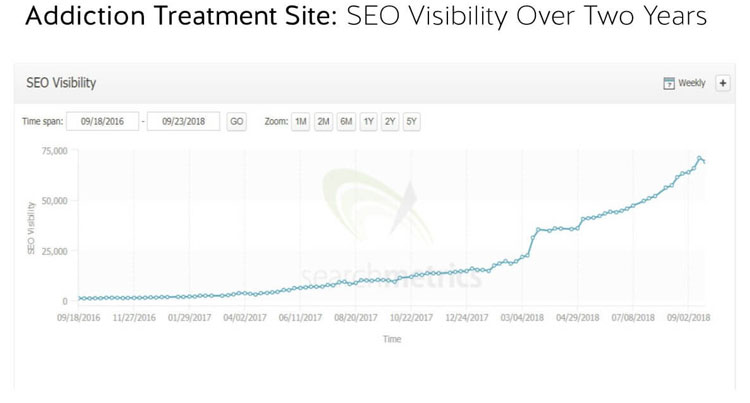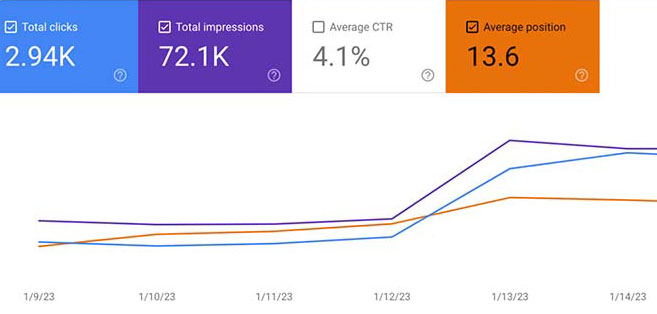If you are on page two of the search results, you might as well be a ghost — you’ll be there, but no one will see you. Ranking well in the search results is difficult enough already and it’s guaranteed to get more competitive in the near future. In this ruthless environment, website owners are looking for every advantage they can get.
The first step on the road to success is a comprehensive search engine optimization (SEO) site audit. Whether you have a small, niche ecommerce site or an enterprise suite of websites totaling millions of pages, the right SEO audit can give you the insight and direction you need to achieve your objectives.

What Is an SEO Audit?
An SEO audit uses investigative methods spearheaded by our experienced consultants, along with multiple analytical tools, to uncover anything that might be hindering your website’s performance in the search engines. It is a technical assessment of how well your website can be discovered, crawled, indexed, and understood by Google and other search engines. Above all, it uncovers the hidden issues (those to which most website owners are oblivious) that are dragging down the site’s performance in organic search.
Why Should I Consider Spending Money on an SEO Audit?
Done correctly, the SEO audit identifies ways to generate more traffic and page views, improve user experience, generate leads, and drive conversions. When considering website changes, an audit is the first step to provide guidance on site structure, content, design, and conforming to Google’s frequent algorithm updates.
In addition to driving more organic search traffic, you’ll learn how to build an engaging website, maximize your potential online, improve audience engagement and conversions, and create a search engine optimization program that builds revenue, brand value, and competitive advantage.
Failing to audit your website may lead to a range of unfavorable outcomes, such as reduced website traffic, compromised user experience, overlooked opportunities, technical glitches, harm to your reputation, inefficacy of marketing campaigns, and even loss of revenue.
What Will Happen During the Audit?
At Atigro, we are unique because we get out of the gate quickly by identifying sitewide issues that have the most significant impact on your search engine rankings. Then we provide immediate recommendations to fix them so that you can start seeing improvements even before the audit is complete.
During the audit, we meet with you weekly to update you on our progress and to ask questions about your industry, target audience, products and services, and online objectives. This helps us gain a better understanding of your business and tailor our approach accordingly.
In between meetings, we analyze your site hygiene, architecture, content, competitors, authority, traffic, keywords, page experience, sitemaps, and everything else that might possibly impact your search engine optimization. Then we develop baseline measurements so that you’ll be able to measure improvement as you implement our recommendations.
A comprehensive SEO website audit includes the following deliverables:
✔ Website Crawl & Audit
✔ Site Architecture Evaluation
✔ Competitor Analysis
✔ Content Quality Assessment
✔ Page Experience Appraisal
✔ Site Authority Analysis
✔ Technical SEO Review
✔ Traffic & Keyword Analysis
✔ On-page SEO Evaluation
✔ Adherence to Google Guidelines
Website Crawl & Audit
It’s critical to understand whether or not your website and all of its content can be discovered, crawled, indexed, and understood by Google and other search engines. To achieve this, we use a crawler to examine your site, mimicking Google’s approach so that we can view your site with the same perspective they have. Analyzing the crawl helps us find SEO-killing problems like duplicate title tags, thin content, unindexed URLs, canonical errors, broken links, and lack of accessibility so that they can be corrected quickly and your organic search traffic can start to improve.
For example, many web content management systems create unnecessary pages. In one recent audit, we found several hundred thousand duplicate pages. Google doesn’t value websites with duplicate or low-quality content and won’t rank their pages highly. Finding and fixing these types of errors has been shown to increase organic traffic over time.
Another problem occurs when two versions of the same website exist and are indexed. It can occur when older versions of a website aren’t redirected properly to the newer ones, for example:
- http://website.com and https://website.com
- https://website.com and https://www.website.com
In one instance, we had to pause a crawl because there were more pages on two versions of the site (https:// and https://www) than the crawler could spider within a reasonable time. We ended after three days with almost 2 million pages found on each version of the website. The solution, which was implemented quickly, was to 301 redirect https://www URLs to https:// URLs.
Site Architecture Evaluation
Site architecture plays an important role in getting your site to rank for the keywords that are most important to you. That’s why we pay special attention to your navigation, folder structure, page depth, filters, and which URLs need to be indexable and which do not. Ultimately, we provide you with site architecture recommendations that help search engines to understand the structure and significance of your content, leading to improved rankings for your primary keywords.
In many instances, we have seen improved organic search results from making small but strategic changes to the site architecture. Something as simple as moving a page up in the navigation can cause it to rank for more queries and get more traffic. Grouping content thematically into hubs has helped websites to rank for highly-desired competitive keywords. Your website’s architecture needs to reflect your company’s strategic priorities. If it doesn’t do that as evidenced by your organic traffic, it’s time to audit and improve it.
Competitor Analysis
The goal of all SEO activity is to take ground from your competitors. In order to pursue this goal effectively, you need to know and understand them like the back of your hand. A useful competitor analysis will look at site authority, backlinks, total ranking keywords, potential traffic, keyword difficulty, UX and many other factors. You need to learn where your competitors are vulnerable and identify specific areas where you can diminish their visibility and increase yours. In addition to eroding their position in the SERPs, you will have an opportunity to eat into their revenue and share of voice. Toba Beta, author of Master of Stupidity has said, “Competition is a rude yet effective motivation.” Let it motivate you to study your competitors so that you can stay ahead of them.
Content Quality & Quantity Assessment
Content quality is a function of both depth and breadth. To achieve this, you must:
- Cover more related topics than the competition
- Cover the full span of knowledge on a subject
- Cover each topic and subtopic more comprehensively than the competition
In August 2022, Google introduced a new ranking system: the Helpful Content Update. In it, pages that Google deems to have unhelpful content are penalized. It’s a threshold system where too many low-quality pages can bring down the ranking of your entire site, even if some pages have high-quality content.
We believe an SEO audit should take a long, hard look at content quality and quantity. Not only can we tell you which of your pages Google views as high quality, but more importantly, we can identify content that is thin, poorly written, does not have the authority to rank, or is duplicated on your website. We can also alert you to topics where you don’t have enough content breadth to rank. In our experience, content improvement equals more organic traffic – every time.
In the chart below, you can see the correlation between rapid content growth, rapid link growth, and the massive increase in traffic to this particular site. Content is no longer just “king”, it is “ruthless dictator”.

Source: Eric Enge, Perficient, Why Content Is More King than Ever
Mobile Experience Appraisal
Google predominantly uses the mobile version of your website for indexing and ranking signals, using its smartphone crawler. The mobile landing view should immediately communicate to users that they are in the right place and have found the content that matches their search query. Improving the mobile experience improves the user experience, sending more and better satisfaction signals to Google. You can do that by:
- Providing an H1 that helps the user quickly orient themselves
- Following Google’s guidelines for interstitials
- Ensuring that lazy-loaded content is not hidden from Google
- Avoiding cumulative layout shifts and meeting other page performance guidelines
Upon implementing our mobile recommendations, one client experienced a surge in organic traffic of almost 150% within one week as shown below.

Site Authority & Backlink Profile Analysis
Backlinks are still a ranking signal to Google. Many times, the competitor who is outranking you, and getting more organic traffic, is the one with the more robust backlink profile. They may have more links, links from more authoritative websites, or a combination of both. At the end of an audit, you need to know how much better their profile is than yours and what you need to do to close the gap.
Technical SEO Audit
Technical SEO is not given the attention it deserves in standard site audits. We believe a technical analysis needs to go deep and should include canonicalization, coding errors, URL structure, indexability, broken links, redirects, a sitemap review, and use of Ajax. Site hygiene is important to achieving and maintaining high rankings in the SERPs. Technically clean sites will almost always outperform their sloppy competitors.
Technical SEO problems are often “heard” but not “seen”. You experience the effects in your site’s performance, but the problems are “under the hood”. While they can be both expensive and time-consuming to address, ignoring them will not make them go away.
Traffic & Keyword Analysis
There are four important questions that a traffic and keyword analysis attempts to answer:
- What keywords (queries) are bringing the most traffic to your website?
- What keywords are bringing ideal traffic to your website?
- What queries do you want to be found for that you are not?
- How difficult will this be to achieve?
Getting accurate answers requires going deep: analyzing traffic over multiple years, looking beyond individual competitors to understand the overlap between them, and using multiple sources of information to gauge the difficulty of ranking for a given query. Attaining a top position on page one of the SERPs requires resources. You want to be confident that you are expending those resources on the right things instead of someone’s best guesstimate.
On-page SEO Evaluation
On-page elements such as meta title tags, meta description tags, headings, alt text, schema, and content contribute to both UX and the higher rankings that bring in more organic traffic. We can identify areas where you are falling short, and provide guidance on how to improve, by comparing your performance with that of the top-ranking pages. For instance, you may be omitting relevant keywords from your title tag or failing to discuss important related topics that other web pages address. These are easy issues to fix once you know about them. Our recommendations are thorough and often have a quick impact on organic traffic as in the example below.

While optimization efforts frequently start with on-page SEO, they don’t end there. An Atigro audit puts these commonly employed techniques into the context of a comprehensive audit so that they can work in synergy with each other.
Adherence to Google Guidelines
While it may not be the case in the future, Google is the king of search engines today, with about 85% of the market share. Therefore, ensuring that your website conforms to its guidelines is an important part of any website audit. To make this happen, your consultants must be thoroughly versed in Google Search Console, Analytics (GA4), and Google Business Profile for local businesses. They need to understand Google’s criteria for local search, news articles, products, EEAT, YMYL, and helpful content. But more than that, the best consultants will have years of experience living through, understanding, and responding to algorithm updates – which are just as certain as death and taxes. They can help you answer questions such as “Is alt text really necessary?”, “How important is site speed?”, “Do I still need to write meta descriptions for every page?” and other ranking factors that change over time.
How Atigro SEO Audits Are Unique
When people tell you a simple, standardized audit will find all your issues, don’t believe it. Our audits are not a commodity nor are they interchangeable with other similar services. While tools can process and analyze large amounts of data better than people can, humans are needed to think creatively, generate alternatives, and conceive new ideas.
Atigro SEO consultants exercise judgment and make decisions based on experience and knowledge. We find big issues fast and deliver customized and prioritized recommendations. You get an extensive analysis, a clear road map, and well-articulated goals.
Consider the following illustration. Just outside of New York City, there is a farmhouse that hasn’t been lived in for 40 years. There are cracks in the walls and ceilings, wallpaper is peeling off of the walls, debris is everywhere, metal has rusted, and thick dust covers rooms that otherwise look like someone will be back at any moment.
The law of entropy applies to websites as well as houses. In the example above, nobody intentionally picked at the wallpaper or threw dust around the room. Without active repair and maintenance, all things deteriorate. Some of these disorders, such as rust, can be readily seen; but much of it occurs unseen and can only be identified with a thorough inspection. A site audit is the same inspection for your website. In the end, you know exactly how much — and what type — of work it will take to make it the best it’s ever been.

Source: Country Living Magazine
To achieve success and reach your goals, it’s critical to maximize your online capabilities. Don’t hesitate. Take action today and let’s talk.

